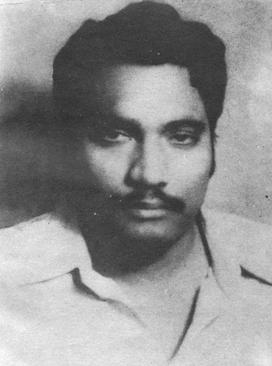Siraj Sikder facts for kids
Quick facts for kids
Sirajul Huq Sikder
|
|
|---|---|
| সিরাজ সিকদার | |
 |
|
| Born | 27 October 1944 |
| Died | 2 January 1975 (aged 30) Savar, Dhaka, Bangladesh
|
| Cause of death | Killed by Police |
| Resting place | Mohammadpur Graveyard |
| Nationality | Bangladeshi |
| Education | BSc in Civil Engineering |
| Alma mater | East Pakistan University of Engineering and Technology (EPUET) |
| Occupation | Engineer, Teacher, Politician |
| Employer | Construction and Building (C&B) Department, The Engineers Limited, Technical Teachers Training College |
| Known for | Poet, Writer, Freedom Fighter, Politician Bangladesh |
| Political party | Purba Banglar Sarbahara Party |
| Spouse(s) | Rawshan Ara Mukti (1966-1969) (Divorce), Jahanara Hakim Rahela (1969-197?)(Divorce), Rawshan (), Rabeya Khatun Runu (), Shaila Amin alias Khaleda () |
| Partner(s) | Jahanara Hakim Rahela (Her husband was government official and had son & daughter) |
| Children | Shika Sikder (Daughter), Shuvro Sikder (Son-Dead), Arun (Son) |
| Parent(s) | Abdur Razzak Sikder (Father) |
| Relatives | Badsha Alam Sikder (brother), Shamim Sikder (sister) |
Siraj Sikder (born 27 October 1944 – died 2 January 1975) was a Bangladeshi politician who believed in big changes for society. He was known for his strong ideas about how Bangladesh should be run.
Early Life and Education
Siraj Sikder was born on 27 October 1944. His birthplace was Lakarta village in Shariatpur District, which was part of British India at the time. His father was Abdur Razzaq Sikder. His family had a history of owning land.
He finished his high school exams from Barisal Zilla School in 1959. After that, he studied at Barisal Brojomohun College. In 1967, he earned a degree in Civil Engineering from the East Pakistan University of Engineering and Technology. This university is now known as BUET.
While he was a student, Siraj Sikder joined a group called the East Pakistan Student Union. In 1967, he was chosen as a vice-president for this student group. Later that year, he started working as an engineer for the government's C & B Department. However, he left this job after only three months. He then started his own private company called Engineering Limited.
Political Journey
On 8 January 1968, Siraj Sikder and some friends started a secret group. They called it the Purba Bangla Sramik Andolon (East Bengal Workers Movement). Their goal was to create a new political party. They believed that East Bengal was like a colony of Pakistan. They thought the main problem was between the Pakistani rulers and the people of East Bengal. They wanted East Bengal to become an independent country. They dreamed of a "People's Republic of East Bengal" that would be free from outside control.
In late 1968, Sikder left his job to open a research center in Dhaka. It was called the Mao Tse Tung Research Center. The Pakistani government later closed it down. After this, Sikder became a teacher at the Technical Teachers Training College in Dhaka.
During the war for independence, on 3 June 1971, Sikder started a new political party. He named it the Purba Banglar Sarbahara Party (Proletarian Party of East Bengal). This party followed the ideas of Marxism and Mao Tse-tung Thought. He tried to start his revolution from a base area in Jhalokati District.
After Bangladesh became independent, Siraj Sikder disagreed with the new government. In April 1973, he formed another group called Purba Banglar Jatiya Mukti Front. He declared that his group was fighting against the Bangladeshi Government. Under his leadership, his party attacked money lenders and landlords.
His Death
In 1975, Siraj Sikder was arrested in Chattagram by government intelligence. He died while in police custody on 2 January 1975. This happened as he was being moved from Dhaka Airport to a camp in Savar.
 | Anna J. Cooper |
 | Mary McLeod Bethune |
 | Lillie Mae Bradford |

